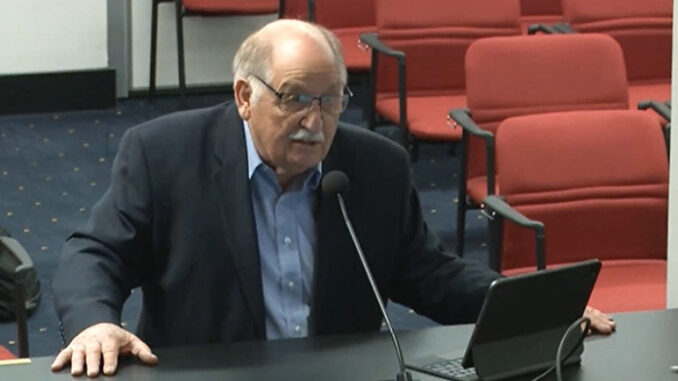
Two members of the University of Arizona’s Faculty Senate testified recently that blame has been wrongly applied in the case of numerous financial woes afflicting the university.
Mark Stegeman, a well-respected associate professor of economics, attempted to lay to rest the erroneous belief that the Faculty Senate bears responsibility for University of Arizona’s troubles in testimony this week to the Arizona Senate Education Committee.
Stegeman informed lawmakers that the Faculty Senate doesn’t receive the budget or monitor spending, has no role in the decision chain concerning the safety issues that led to the death of Professor Thomas Meixner, and had no role in the controversial acquisition of Ashford University. Indeed, Stegeman related in a later interview, many Senators expressed deep public concerns about the proposed acquisition.
In his testimony, Stegeman informed lawmakers that the Faculty Senate has but one significant authority: approving new programs and degrees.
“The Faculty Senate has very little authority in the university, so there may be need for more accountability and oversight, but it’s not about any problem the Faculty Senate has created,” said Stegeman. “I don’t know what problem this bill purports to solve.”
University Of Arizona Professors Explain Role Of Faculty Senate… pic.twitter.com/ZpiATiLSvP
— Arizona Daily Independent (@amerdailyindy) March 25, 2024
Stegeman said even that authority is exercised in response to initiatives that come from university administration. Stegeman testified that the Faculty Senate hadn’t created any new program during his involvement. Rather, the governing body has merely approved administrative requests for new programs.
The economics professor testified to prevent the passage of Senator Travis Grantham’s HB 2735, which would strip the minimal authority awarded to governing bodies like the Faculty Senate and reassign it to the Arizona Board of Regents (ABOR), who would then delegate that authority back to the university president. Faculty governing bodies would serve only as consultants, rather than bear any decision-making responsibility.
Stegeman said that this would erase a process that greatly increases transparency about the creation of new degrees and programs, which often lead to the creation of new administrative positions. He said that, over the past seven years, administrative positions at UA had increased by 43%, while faculty positions had increased by 8%. The Faculty Senate approval process is one of the few institutional checks on this growth.
As an example, he pointed out that Faculty Senators asked detailed and sensible questions about one recently approved degree program, the “Global MD,” which would send students to Australia for the first two years of medical training that is not accredited in the U.S., emphasizes Indigenous medical practices, and has a program startup cost of $14.5 million. Although the Faculty Senate eventually approved the proposal, which originated with the administration, on a split vote, the Senate approval process created an extensive and valuable public record, which is available to anyone on the Faculty Senate website.
Grantham used the University of Arizona’s recent financial and organizational woes as the poster child for his bill. Grantham blamed the Faculty Senate for it all, an interpretation he says was informed by policy staff.
“They kind of had this model taking place that was shared governance. And shared governance is not how the universities are supposed to operate,” said Grantham during last month’s House Appropriations Committee hearing. “What has occurred is UofA in particular — I’m going to pick on them — has kind of morphed into another realm where numerous presidents have come through that have kind of allowed this to happen and it’s blossomed and now it’s caused the massive deficit issues you’re seeing with UofA, and they’re fighting hard to try to get their university back under control.”
In the later interview, Stegeman reiterated that no shared governance bodies at the University of Arizona are in the decision chain for the university’s budgets and spending; indeed, the Faculty Senate is generally not even consulted on the budget. He also pointed out that some form of shared governance is common at the major public universities and often has a stronger implementation than it has at the University of Arizona.
According to Stegeman, however, the bill won’t have any effect on bringing the university under control. Instead, it would remove critical Faculty Senate and public input on approving new programs and degrees.
Stegeman’s testimony was supported by Ted Downing, a fellow University of Arizona Faculty Senate member and research professor of social development, who credited elected faculty members for identifying and warning about the issues University of Arizona faced far in advance, namely the financial problems presented by the Ashford University acquisition, years before ABOR issued its report.
“[The Faculty Senate can] identify mischief, and waste, and mismanagement within the organization. We should copy this model elsewhere,” said Downing. “This is the canary in the mineshaft.”
Neither testimony persuaded the committee’s Republicans; the bill passed 4-3, with only committee Democrats opposing it.

These two gentlemen are heroes for exposing the Regents and administration for growing administration and proposing inane majors that require the added administration. Unfortunately, all of you boobs are too stupid to understand that.
Maybe over-paying “educated” idiots is part of the problem… over-building athletic facilities… golden parachuting fired coaches… paying off the debt of a newly- hired athletic director… firing the financial honcho responsible for overseeing the budget only to hire her back at same salary as a financial advisor… gee, see a pattern here? Fire them all.
WEAK